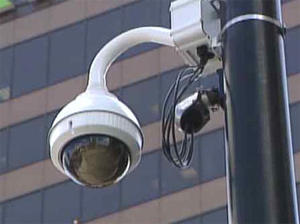SurveillanceDramatic expansion of DC surveillance camera network
Washington, D.C. is proposing a plan that would add thousands of surveillance camera feeds from local businesses to the city’s homeland security agency existing command center; the city already monitors more than 4,500 cameras placed in its public transportation system and schools; critics say that this is a poor use of resources and violates civil liberties; cities like New York, London, and Baltimore already employ this practice

Civilian surveillance video will feed into police network // Source: witf.org
The District of Columbia is planning to widen its video surveillance net by adding in thousands of video feeds from private businesses around the nation’s capital.
Washington, D.C.’s Homeland Security and Emergency Management Agency (HSMEA) currently receives more than 4,500 feeds from cameras that the city has installed around its public transportation hubs and schools.
The cameras are operated by the D.C. Department of Transportation and school system, which collectively monitor these video streams in homeland security’s Joint All-Hazards Operation Center. HSMEA’s proposed plan would bring feeds from thousands more cameras currently deployed in banks, corner stores, and gas stations, a practice other cities like New York, London, and Baltimore already employ.
According to Robyn Johnson, a spokeswoman for HSEMA, the cameras are designed to raise “situational awareness” during “developing significant events.”
The proposed plan is meeting sharp resistance from critics who believe that the system violates civil liberties and is a poor use of resources.
According to Jeffrey Rosen, a George Washington University law professor who studies the relationship between security and civil liberties, “The D.C. effort to link public and private watching capabilities might be viewed as excessive.”
“It would make it hard to find a place in the city where people aren’t being watched by cameras,” he added.
The surveillance program began in the spring of 2008, and faced criticism from the D.C. City Council then as well.
“If HSEMA intends to put more staff on to monitor these cameras, it would not be a good use of resources,” says D.C. Councilman Phil Mendelson, who oversees the homeland security agency.
He said, “My concern about these cameras has always been that there’s no evidence they reduce crime.”
Johnson said that the HSMEA “program has not expanded to include private businesses,” but “we continue to explore this in a deliberative way.”
She added that HSEMA is seeking to protect civil liberties and is developing regulations and guidelines for the use of the new system.
